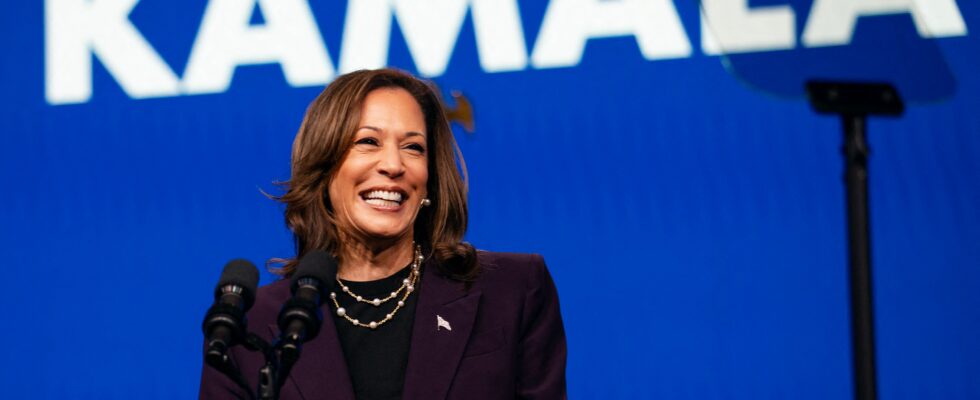It all starts with a coconut. For the past few weeks, the emoji has been used as a symbol for candidate Kamala Harris and has been appearing all over social media. Originally, the vice president gave a speech at the White House to inaugurate a commission on equal opportunity in education. Her role is to focus on children in school, but also in their family “context.” The word reminds her of an expression her mother, an oncologist of Indian origin, used about young people: “Do you think you just fell out of a coconut tree? You exist in the context of everything you live in and what came before you,” launches a hilarious Kamala Harris.
The video, which has been circulating on social media since then, combines two of the vice president’s attributes: her sometimes convoluted sentences and her great bursts of laughter. Above all, this light-hearted moment contrasts with the gloomy atmosphere of the announced duel between Joe Biden and Donald Trump. Since the announcement of the Democratic president’s withdrawal in favor of Kamala Harris, the image has been recovered: thousands of young Democrats who are part of the “coconut army” say they are “doped on coconut.”
Reaping the benefits of memes
This funny case represents Kamala Harris’ strategy on social networks. Viral enthusiasm often arises in spite of herself around a speech, a laugh or a few dance steps, like when she confides her passion for Venn diagrams or shares a roast chicken recipe. But she turns it to her advantage to cultivate the moment and feed her momentum. In order to reap the benefits of all these “memes”, these humorous images circulating on the Internet, the Democratic candidate even registered, on Friday, July 26, on TikTok, the Chinese social network that Joe Biden wanted to ban if he did not change ownership. Her audience is already there: her official page has 2.5 million subscribers and the few videos published have millions of views.
It must be said that Kamala Harris has some catching up to do. Donald Trump, who joined TikTok last Februarycrushes the competition with 9.2 million followers and videos viewed more than 150 million times. But the former president does not seem very active on the social network. Only five videos have been published in five months. The man who revolutionized the use of networks in 2016 by using Twitter compulsively puts himself in muscular confrontations there… but not very original. For example, he poses face to face with wrestling star Logan Paul. And in his latest video, he uses his famous phrase for Kamala Harris “You’re fired” (Editor’s note: you’re fired), from the time he presented the TV show The Apprentice.
“Kamala is brat”
On the other side, Democrats are playing the humor and modernity card. In addition to her first campaign ad on the song “Freedom” by Beyoncé, the former Californian prosecutor is showing herself on TikTok with the drag show team, Drag Race, or with Lance Bass, the singer of the boy band NSYNC, with whom she says “bye, bye, bye” to Donald Trump, in reference to a song by the group. Her campaign page, KamalaHQ (Editor’s note: for headquartersheadquarters), which was still called Biden-HarrisHQ a few days ago, is investing even more in this area by taking up all the codes of TikTok: trending songs, current challenges and mockery – one song relays the call for donations from Trump’s running mate, JD Vance, but suggests that he needs the money to pay for therapy.
All these videos, liked millions of times, reflect a certain “kamalamania”, a craze that Democrats have been sorely lacking for several years, and particularly in recent months, with growing concerns about Joe Biden’s age. Kamala Harris, who lived through his presidency in the shadows without being able to really show who she was, can now use this enthusiasm on social networks to make people identify with her. Hence the phrase that has also gone viral: “Kamala is a brat.” That’s what British pop star Charli XCX tweeted.taking up the title of his album Bratreleased a few weeks ago. Initially, this term refers to a badly brought up and capricious child. But for the singer, it refers to a lively young woman, who likes to laugh, dance and party, says what she thinks and accepts her faults. In short, an image of a modern woman, in tune with her time, who appeals to a large part of the youth.
Of course, social media likes don’t win an election. But generating that kind of energy, especially in a short and unexpected campaign, is necessary to get voters to donate, campaign, knock on doors, and vote. And that kind of mobilization is one of the keys to Kamala Harris’s victory. Four years ago, high voter turnout helped Joe Biden win the White House.
As for TikTok, it allows you to reach a highly coveted audience and opinion leader who doesn’t often go to the polls: young people. According to a PewResearch survey published last Junemore than a third of the social network’s 170 million American users use it to follow political news. Enough to justify the sometimes costly means taken by political parties to create content.
